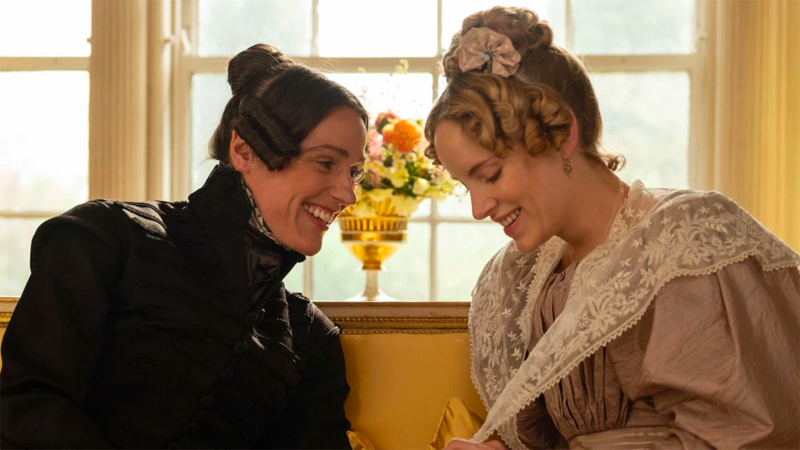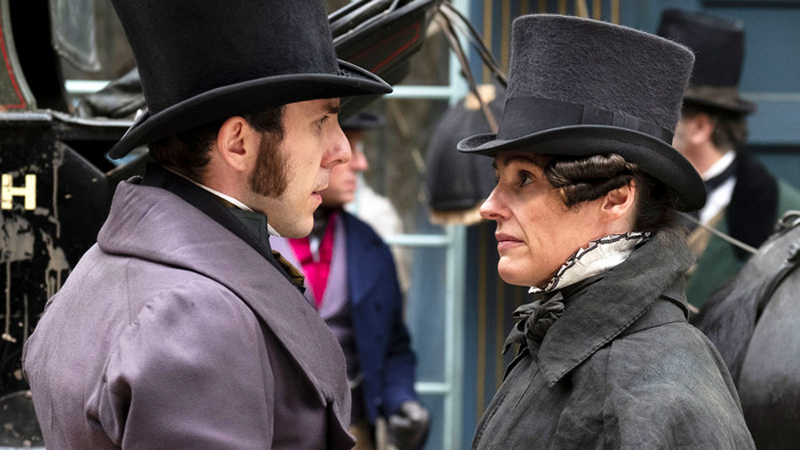Anne Lister could not be contained. Not by her parents. Not by her boarding school. Not by her home at Shibden Hall, despite the fact that it made her one of the only land-owning single women in Britain’s 19th century. Not even by Britain itself. Or mainland Europe, for that matter. Anne Lister could not be contained by her church or traditional gender expression or patriarchal notions about sexuality. How, then, can an eight-episode mini-series based on the four million words she wrote in her diaries over her lifetime contain her? Well, it can’t. And to the great credit of HBO’s Gentleman Jack it doesn’t even try. Suranne Jones’ Lister is too big for the hallways of Shibden, too big for the town of Halifax. She doesn’t wait for carriage doors to be opened for her; she leaps from them. She doesn’t wait to be invited in; she hardly even knocks. Jones’ Lister is breathless because she never stops moving. The show’s whimsical, marching score can barely keep up with her.
Jones’ Lister also displays a seductive, sensual, capable, robust soft butch energy that makes Shane McCutcheon look like a clumsy little baby goat.

Gentleman Jack kicks off in 1832, the 41st year of Anne Lister’s life, over two decades into her realizing, “I love and only love the fairer sex and thus, beloved by them in turn, my heart revolts from any other love than theirs.” She owns an estate, over which she exercises complete control; that estate is rich with coal; she’s long been settled on wearing men’s clothes, in all black; the only thing she’s in want of, as Jane Austen predicted of all well-off gentleman, is a wife.
Lord knows she’s seduced her fair share of women. Gentleman Jack wants you to know she knows she’s impossible to resist. And she’s come close, many times, to securing a forever female companion — but they keep leaving her for men with status and money. In the 26 volumes of her diary, Anne writes about a lot of things — her finances, her exercise routines, her family squabbles, town gossip, her plans to solely inherit Shibden and her plans to improve it, the workman she employs and digs alongside — but most of all she writes with ecstasy and despair about the women in her life. For all her power and success, for every way she’s in control, all Anne really wants is to love and be loved. Suranne Jones makes intense eye contact with women. She makes them duck their heads and blush. She comments on the fullness of their lips. She wails in agony in the lap of another woman who promised to share her life but then leaves her for another Mr. So-and-So.
And while Gentleman Jack doesn’t linger on her rare bouts of rumpled confidence, it also doesn’t bluff on the trouble Anne had answering questions about her gender and sexuality. “Are you a man?” the young son of one of her tenants asks her in an early episode. His parents freeze, grimace, brace themselves. “Well, that’s a… question,” she says to him, quietly, almost conspiratorially. “And you are not the first person to ask it. I was in Paris once, dressed extremely well, I thought, in silk and ribbons, ringlets in my hair. Very ladylike. Even then, someone mistook me for a, well… hmm. So, no. I am not a man. I’m a lady. Woman. I’m a lady-woman. I’m a Woman.” He seems satisfied with the answer, and they shift the conversation to his toy soldier.

Gentleman Jack also doesn’t shy away to the lengths Anne went to to understand herself. She was quite at ease with her nature because she’d only always been interested in women, and couldn’t be interested in men, no matter how hard she tried. She firmly believed God made her the way she was. But she was fascinated with anatomy, curious about how or if it informed desire, and she sought out teachers from medical schools across Europe, especially France, who would allow her to work alongside them with cadavers and dissected organs. She was as good with science as she was with math, and literature, and mountain-climbing, and socializing, and everything. “I dissected a fetus once,” she proudly tells her neighbor, Ann Walker, the woman she’s got her eyes on when the series begins. She’s unashamed of her “peculiarities,” and Ann Walker — like every other woman in Anne Lister’s life — is enthralled by them.
Less enthralled are the men in Anne’s world, and Gentleman Jack pulls directly from Lister’s diaries again to add myriad external conflicts to the series. There’s the matter of her coal and the bankers who are stealing it; the matter of her tenants, especially the ones who don’t respect her authority or try to cheat her. She delights in outmaneuvering them, in making them feel like the bumbling idiots they assume her to be because she’s a woman. They’re dangerous, these men, and she knows that, but she’s undeterred. The more they try to intimidate her, the more she embarrasses them, and the angrier they get.

Perhaps most surprisingly, Gentleman Jack is unafraid of Lister’s complicated legacy. She’s called the “first modern lesbian” by many scholars; there’s an official blue historical plaque — the only one in the UK bordered by a rainbow — on the church where she eventually had a private wedding ceremony with Ann Walker. Yet, she set her eyes on Ann Walker originally for her money. And Ann Walker struggled mightily with her own mental health. Lister didn’t believe in social or political reform. She wanted the right to vote, sure — not because she was a woman, but because she owned property. She didn’t believe the merchant class, and certainly not the peasantry, should be viewed as equals of the landed gentry.
We want, even now, the women in our stories — and every real-life woman who performs for us, from politics to pop culture — to live a life above reproach. When a man is less than perfect, he’s just a man. When a woman, especially a gay woman, who doesn’t conform to gender norms, is less than perfect, her literal humanity is called into question. Gentleman Jack keeps its eyes wide open as it examines the fullness of Anne Lister’s life. She does the hard thing, the heartbreaking thing, no one else can do. She tips her top hat. She runs her hand up the silk stockings, inside the petticoat, of another woman. She whispers gently. She refuses to listen. Her arrogance is astounding. Her pain is visceral. Anne Lister looks directly into the camera, from 1832 to 2019, and winks.



I’m reading her diaries now and I can not believe they’re making this into a show! It’s so gay and defiant!!!! I’m gonna go buy HBO now
we have a catchphrase in my house, “NOT ALL LESBIANS ARE AWESOME”, which I think probably applies to Lister. But I love Sally Wainwright’s other stuff, and I love the actors she always works with, so I’m pretty excited to see where the series goes. Can’t really kill the main character, can she?
“Suranne Jones’ Lister displays a seductive, sensual, capable, robust soft butch energy that makes Shane McCutcheon look like a clumsy little baby goat.”
Is it wrong that I am extremely turned on by this line?
Is it wrong that I want Lister to strut in looking dapper and overly confident and turn Shane into that clumsy little baby goat?
And then “My Fair Butch” Shane into some better clothes?
I’ve been waiting for this series with bated breath ever since I first heard about it two years ago! Two years of searching for any tiny bit of info on it and wondering if it was still even coming. Hard to believe it’s finally airing tonight!
Looking forward to this!
Glad both that the series won’t be shying away from Lister’s imperfections, and that you have highlighted how important it is that we get to see these sorts of complete portrayals of iconic figures from our history.
I started watching this last night and holy shit wow. I’m transfixed. It’s beautiful! She’s beautiful. I need eight seasons.
What an incredible review. It actually told me everything I was interested to know from the series, from her characterization as well as the depiction of her sexuality, to her gender identity, to commentary on her industrialism.
“She tips her top hat. She runs her hand up the silk stockings, inside the petticoat, of another woman. She whispers gently. She refuses to listen. Her arrogance is astounding. Her pain is visceral. Anne Lister looks directly into the camera, from 1832 to 2019, and winks.”
Wonderful writing, wonderful portrait, wonderful piece!
I think I need to figure out who around me has an HBO account!!!!!
This is everything I’ve ever wanted
Is anyone else swooning over the intro sequence? The buttoning! The coat swoosh! The roguish music! It makes me feel almost too gay to function.
It’s amazi
Do they ever have our number
Will there be weekly recaps ? Please?
Oof. Thank you Heather!!!!
I don’t want to be the downer, but I’m kind of surprised at the positive reaction to this show. I find kind of everything about Anne Lister’s politics repulsive. She’s against the vote for people who don’t own land, is deeply classist and capitalist, and probably has seriously shitty race politics (not that they’ve put those on screen yet). She treats women like a modern day pick-up artist, and chooses her future wife based on her wealth. Honestly she strikes me as a standard white, wealthy asshole, except she happened to be a woman. I find her ethics, her commitments repulsive.
What happened to intersectionality? The achievements of a white, incredibly wealthy, upperclass woman are not the achievements of us all. Her success was premised on the exact systems of oppression we’re so critical of today.
I’m really not trying to be difficult. I want to see cool queer people of history represented on screen, but I really can’t stand seeing Anne’s response shooting down one of her tenants, when he remarks something about how the class dynamics will change one day, celebrated as a feminist victory. I would have expected more critique of this show from venues like this.
Also, really, I’m not trying to not say that it’s fucking awesome to have queer, (maybe even) butch representation. It’s awesome that Anne was a lesbian through and through, that she got to write so much of her life down, that she was wealthy enough to write it down and have it preserved, that she was radically herself in a world that wanted her to be a standard “lady.” But I just wish the show was a little more self-conscious, a little more even-handed in her portrayal, or, in the absence of that, that we were more even-handed in our praise.
A quick note, my “(maybe even)” wasn’t ‘maybe it’d be cool to have butch representation,’ because obviously it would be. It was just hesitancy at calling Lister butch. I don’t identify as butch and didn’t want to misrepresent being butch or Lister, etc.